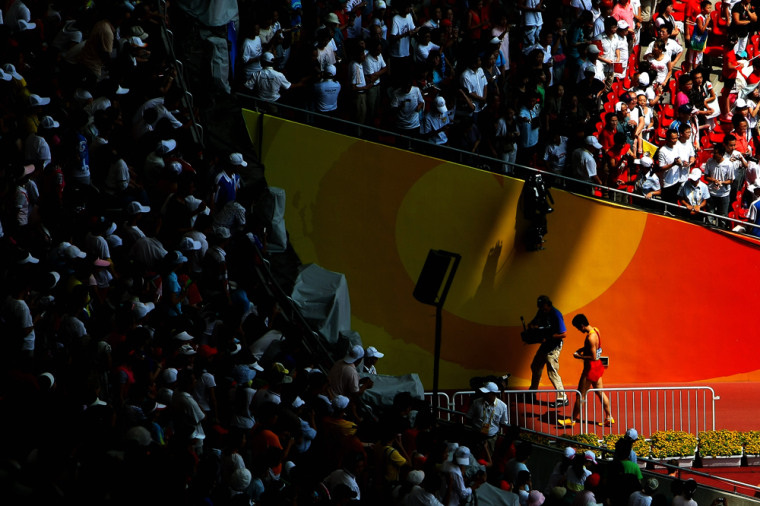As Liu Xiang limped off the track and hobbled into the tunnel Monday an entire stadium — and an entire nation — was stunned. Many sat in silence, letting the monumental moment sink in. Others cried.
The 25-year-old hurdler who won gold in Athens in 2004 is a national hero on par in popularity with Yao Ming. He was expected to cap China's resounding success at the Olympics — 35 gold medals and counting — with another gold medal in the 110-meter hurdles final Thursday night. Instead Chinese spectators, many of whom took the day off to watch Liu compete, were left heartbroken as he withdrew from the event on Monday.
A 14-year-old boy, who was holding two China flags, was sitting forlornly under a tree. He had gone to the Bird's Nest with his mother to watch Liu.
"Everyone was very sad, very disappointed," Yu Cheng Zhou, his head down, said shyly.
He said he didn't cry, but wanted to "a little."
"I was very sad," said a man who would give only his surname, Sun. He and his family had watched the heat on one of the large projection screens on the Olympic Green.
"He didn't have to get the gold, but it's disappointing he didn't get to the final. He was our only hope in track and field"
All along the Green, Chinese fans were seeking shelter from the glaring sun and digesting what transpired hours earlier. Most were calling the injury a "shame" or a "disappointment." None believed that Liu, who reportedly battled a hamstring injury for months, could have pulled out on purpose.
"What a very, very big shame," said 62-year-old Tian Xiang Dong. "He must have been injured because there isn't any other reason for him to not compete."
Tian, a retired diplomat who said he had worked in Washington D.C. and Africa, didn't think the pressure from 1.3 billion people affected Liu.
"He already attended the last Olympics," he said. "He should be used to the pressure ... Like any other athlete in the world, Liu wanted to compete. But his condition prevented him."
What asked if Liu might receive any criticism from fellow citizens Tian said it was possible.
"Some Chinese might not understand so they might think there are other reasons that caused him to pull out."
For two 17-year-old girls from Beijing — they were sitting a few hundred steps from a visage of Liu promoting Visa — their view of Liu remained unchanged. He was still a national icon, a man who would redeem himself four years from now in London.
"We are disappointed ... but at the next Games, he will win," said one of the girls, who didn't want to give their names. Hope springs eternal, especially among the young. Liu will be pushing 30, ancient in track and field age, in 2012.
Nearby, Liu Bing was sitting with a group of supporters. His face was painted with the Chinese flag and the Olympic rings. He had been in the stadium, leading cheers in the morning until Liu Xiang's injury caused thousands of spectators to flock to the exits.
Again, he said he was disappointed — all six people who were interviewed used the same word. But the 33-year-old from Hubei province said that China shouldn't let Liu's injury define the Games.
"For us, the most important thing is that China hosts a successful Olympics," he said. "We not only come to support Liu Xiang, we're here to support the Olympic Games."
But had his view of Liu Xiang changed?
"No, it hasn't," he said. "I still like him very much."
NBC translator Li Le contributed to this report.
